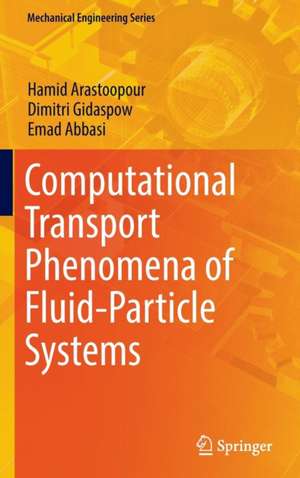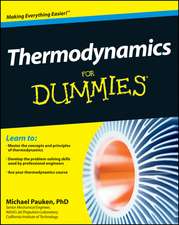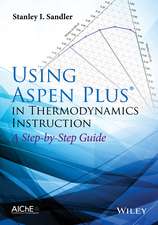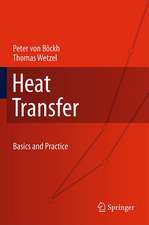Computational Transport Phenomena of Fluid-Particle Systems: Mechanical Engineering Series
Autor Hamid Arastoopour, Dimitri Gidaspow, Emad Abbasien Limba Engleză Hardback – 3 ian 2017
| Toate formatele și edițiile | Preț | Express |
|---|---|---|
| Paperback (1) | 772.60 lei 43-57 zile | |
| Springer International Publishing – 7 iul 2018 | 772.60 lei 43-57 zile | |
| Hardback (1) | 778.45 lei 43-57 zile | |
| Springer International Publishing – 3 ian 2017 | 778.45 lei 43-57 zile |
Din seria Mechanical Engineering Series
-
 Preț: 391.84 lei
Preț: 391.84 lei - 18%
 Preț: 1110.72 lei
Preț: 1110.72 lei - 15%
 Preț: 593.73 lei
Preț: 593.73 lei - 18%
 Preț: 944.99 lei
Preț: 944.99 lei - 15%
 Preț: 653.14 lei
Preț: 653.14 lei - 17%
 Preț: 363.13 lei
Preț: 363.13 lei - 18%
 Preț: 1239.05 lei
Preț: 1239.05 lei - 15%
 Preț: 640.06 lei
Preț: 640.06 lei - 18%
 Preț: 1129.65 lei
Preț: 1129.65 lei - 15%
 Preț: 522.24 lei
Preț: 522.24 lei - 15%
 Preț: 654.77 lei
Preț: 654.77 lei - 15%
 Preț: 643.34 lei
Preț: 643.34 lei - 15%
 Preț: 611.40 lei
Preț: 611.40 lei - 18%
 Preț: 765.96 lei
Preț: 765.96 lei - 20%
 Preț: 631.71 lei
Preț: 631.71 lei - 18%
 Preț: 1009.22 lei
Preț: 1009.22 lei -
 Preț: 418.34 lei
Preț: 418.34 lei - 15%
 Preț: 640.71 lei
Preț: 640.71 lei -
 Preț: 403.53 lei
Preț: 403.53 lei - 18%
 Preț: 813.97 lei
Preț: 813.97 lei - 18%
 Preț: 1386.48 lei
Preț: 1386.48 lei - 18%
 Preț: 951.47 lei
Preț: 951.47 lei - 18%
 Preț: 833.09 lei
Preț: 833.09 lei - 18%
 Preț: 936.60 lei
Preț: 936.60 lei - 15%
 Preț: 644.49 lei
Preț: 644.49 lei - 18%
 Preț: 941.05 lei
Preț: 941.05 lei - 18%
 Preț: 1386.17 lei
Preț: 1386.17 lei -
 Preț: 399.67 lei
Preț: 399.67 lei - 18%
 Preț: 1389.44 lei
Preț: 1389.44 lei - 18%
 Preț: 790.46 lei
Preț: 790.46 lei - 18%
 Preț: 1388.22 lei
Preț: 1388.22 lei - 18%
 Preț: 1024.53 lei
Preț: 1024.53 lei - 15%
 Preț: 590.16 lei
Preț: 590.16 lei - 18%
 Preț: 1234.00 lei
Preț: 1234.00 lei - 18%
 Preț: 1386.62 lei
Preț: 1386.62 lei - 15%
 Preț: 543.85 lei
Preț: 543.85 lei -
 Preț: 391.61 lei
Preț: 391.61 lei - 18%
 Preț: 944.19 lei
Preț: 944.19 lei - 18%
 Preț: 736.16 lei
Preț: 736.16 lei - 18%
 Preț: 943.88 lei
Preț: 943.88 lei - 15%
 Preț: 693.21 lei
Preț: 693.21 lei - 18%
 Preț: 781.77 lei
Preț: 781.77 lei - 15%
 Preț: 639.08 lei
Preț: 639.08 lei - 23%
 Preț: 737.29 lei
Preț: 737.29 lei - 15%
 Preț: 641.53 lei
Preț: 641.53 lei -
 Preț: 401.42 lei
Preț: 401.42 lei
Preț: 778.45 lei
Preț vechi: 949.33 lei
-18% Nou
Puncte Express: 1168
Preț estimativ în valută:
149.00€ • 161.91$ • 125.24£
149.00€ • 161.91$ • 125.24£
Carte tipărită la comandă
Livrare economică 21 aprilie-05 mai
Preluare comenzi: 021 569.72.76
Specificații
ISBN-13: 9783319454887
ISBN-10: 3319454889
Pagini: 125
Ilustrații: XI, 103 p. 28 illus., 15 illus. in color.
Dimensiuni: 155 x 235 x 8 mm
Greutate: 0.34 kg
Ediția:1st ed. 2017
Editura: Springer International Publishing
Colecția Springer
Seria Mechanical Engineering Series
Locul publicării:Cham, Switzerland
ISBN-10: 3319454889
Pagini: 125
Ilustrații: XI, 103 p. 28 illus., 15 illus. in color.
Dimensiuni: 155 x 235 x 8 mm
Greutate: 0.34 kg
Ediția:1st ed. 2017
Editura: Springer International Publishing
Colecția Springer
Seria Mechanical Engineering Series
Locul publicării:Cham, Switzerland
Cuprins
Conservation Laws for Multiphase Flow.- Conservation and Constitutive Equations for Fluid-Particle Flow Systems.- Homogeneous and Non-homogeneous Flow of the Particle Phase.- Polydispersity and the Population Balance Model.- Case Studies.
Textul de pe ultima copertă
This book concerns the most up-to-date advances in computational transport phenomena (CTP), an emerging tool for the design of gas-solid processes such as fluidized bed systems. The authors examine recent work in kinetic theory and CTP and illustrate gas-solid processes’ many applications in the energy, chemical, pharmaceutical, and food industries. They also discuss the kinetic theory approach in developing constitutive equations for gas-solid flow systems and how it has advanced over the last decade as well as the possibility of obtaining innovative designs for multiphase reactors, such as those needed to capture CO2 from flue gases. Suitable as a concise reference and a textbook supplement for graduate courses, Computational Transport Phenomena of Gas-Solid Systems is ideal for practitioners in industries involved with the design and operation of processes based on fluid/particle mixtures, such as the energy, chemicals, pharmaceuticals, and food processing.
- Explains howto couple the population balance equation (PBE) with CTP models and use available methods of moments to solve these equations;
- Addresses modified CTP governing equations and codes that predict the effect of non-homogeneous flow on process design and scale-up;
- Provides theoretical equations of state and transport properties for each phase of granular flow kinetic theory.
Caracteristici
Explains how to couple the population balance equation (PBE) with CTP models and use available methods of moments to solve these equations Addresses modified CTP governing equations and codes that predict the effect of non-homogeneous flow on process design and scale-up Provides theoretical equations of state and transport properties for each phase of granular flow kinetic theory











